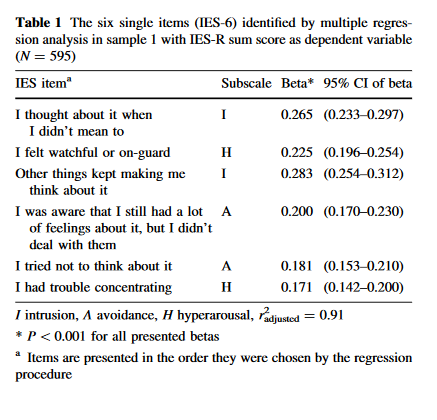This MMWR piece is making the rounds again.
It's a really nice survey showing that essential workers and people providing unpaid care to others are experiencing considerable emotional strain.
That's their main finding and what they actually prove. https://www.cdc.gov/mmwr/volumes/69/wr/pdfs/mm6932a1-H.pdf
It's a really nice survey showing that essential workers and people providing unpaid care to others are experiencing considerable emotional strain.
That's their main finding and what they actually prove. https://www.cdc.gov/mmwr/volumes/69/wr/pdfs/mm6932a1-H.pdf
Unfortunately, a lot of people are latching onto specific descriptive statistics that seem extreme.
Specifically, let's discuss their metrics for anxiety and depression.
Specifically, let's discuss their metrics for anxiety and depression.
They use the PHQ-4 system to identify people with symptoms of anxiety or depression.
What is the PHQ 4?
It's a 4-question self-diagnostic of depression or anxiety.
What is the PHQ 4?
It's a 4-question self-diagnostic of depression or anxiety.
You can see it here:
https://www.cdc.gov/mmwr/volumes/69/wr/pdfs/mm6932a1-H.pdf
https://www.cdc.gov/mmwr/volumes/69/wr/pdfs/mm6932a1-H.pdf
So if you report that you feel nervous or on edge every day, you're more likely to be coded as anxious.
Normally, that makes sense.
Normally, that makes sense.
But the problem is that clinical anxiety or depression isn't just "feeling sad" or "feeling anxious." An Olympic athlete feeling anxious before the big race doesn't "have anxiety." If you're sad after your dog died, that doesn't mean you "have depression."
Generally speaking, depression and anxiety as conditions are applied to chronic, severe, or ununusual feelings of sadness or worry.
If your spouse dies and you *don't* feel sad that may be it's own disorder! If you don't experience any anxiety, you may be a sociopath!
If your spouse dies and you *don't* feel sad that may be it's own disorder! If you don't experience any anxiety, you may be a sociopath!
Put bluntly, if you are not feeling a degree of sadness about the quarter of a million or more excess deaths in America so far this year, you probably have some kind of emotional disorder.
If you got through this spring without feeling "down" or "hopeless" more frequently than usual, THEN YOU ARE NOT A RATIONAL PERSON.
Pathologizing empathetic responses to public suffering and rational psychological responses to a lethal and contagious disease is probably not a good idea!
One of the questions is "Little interest or pleasure in doing things."
Yes.
Because it is not pleasurable to go and do things when doing so means you might die or kill others!
Yes.
Because it is not pleasurable to go and do things when doing so means you might die or kill others!
You're not suffering from an acute attack of anhedonia if you spent a lot of the spring being bored!
You were bored because everything was cancelled!
That's not depression!
You were bored because everything was cancelled!
That's not depression!
So, if you reported a summed score of 3 or more on the first two questions, they score you as having anxiety, even though, um, that's.... not anxiety. TONS of people have had a day where they worried themselves sick BECAUSE THEY THOUGHT THEY INFECTED SOMEONE.
Been there! Super sucks!
Not clinically meaningful anxiety!
Not clinically meaningful anxiety!
And what about the post-traumatic stress indicator?
For that they use something called the "Impact of Event Scale." Normally it has about 22 items but you can approximate it very closely with just 6 items. Here's the 22: http://www.clintools.com/victims/resources/assessment/ptsd/ies.html and the usually-used 6:
For that they use something called the "Impact of Event Scale." Normally it has about 22 items but you can approximate it very closely with just 6 items. Here's the 22: http://www.clintools.com/victims/resources/assessment/ptsd/ies.html and the usually-used 6:
So let's cover one issue right up front.
You can't really measure "post" traumatic stress *while* the event is occurring.
It isn't *post* yet. You're measuring *peri* traumatic stress. The authors of the paper do note this, but many readers don't.
You can't really measure "post" traumatic stress *while* the event is occurring.
It isn't *post* yet. You're measuring *peri* traumatic stress. The authors of the paper do note this, but many readers don't.

 Read on Twitter
Read on Twitter


